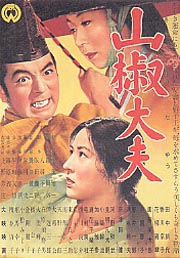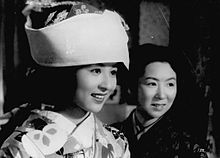Sansho the Bailiff
Sansho the Bailiff , Sansh Day? is a 1954 Japanese period film directed by Kenji Mizoguchi. Based on a short story of the same name by Mori gai, it tells the story of two aristocratic children sold into slavery. It is often considered one of Mizoguchis finest films, along with Ugetsu and The Life of Oharu. It bears his trademark interest in freedom, poverty and womans place in society, and features beautiful images and long and complicated shots. The director of photography for this film was Mizoguchis regular collaborator Kazuo Miyagawa.
Sansho the Bailiff is a jidaigeki, or historical film, set in the Heian period of feudal Japan. A virtuous governor is banished by a feudal lord to a faroff province. His wife and children are sent to live with her brother. Several years later, the wife, Tamaki Kinuyo Tanaka, and children, Zushi and Anju, journey to his exiled land, but are tricked on the journey by a treacherous priestess. The mother is sold into prostitution in Sado and the children are sold by slave traders to a manorial estate in which slaves are brutalized, working under horrific conditions and branded when they try to escape. The estate, protected under the Minister of the Right, is administered by the eponymous Sansh Eitar Shind, a bailiff or steward. Sanshs son Tar Akitake Kno, the secondincharge, is a much more humane master, and he convinces the two they must survive in the manor before they can escape to find their father.The children grow to young adulthood at the slave camp. Anju Kyko Kagawa still believes in the teachings of her father, which advocate treating others with humanity, but Zushi Yoshiaki Hanayagi has repressed his humanity, becoming one of the overseers who punishes other slaves, in the belief that this is the only way to survive. Anju hears a song from a new slave girl from Sado which mentions her and her brother in the lyrics. This leads her to believe their mother is still alive. She tries to convince Zushi to escape, but he refuses, citing the difficulty and their lack of money. ........
Source: Wikipedia





